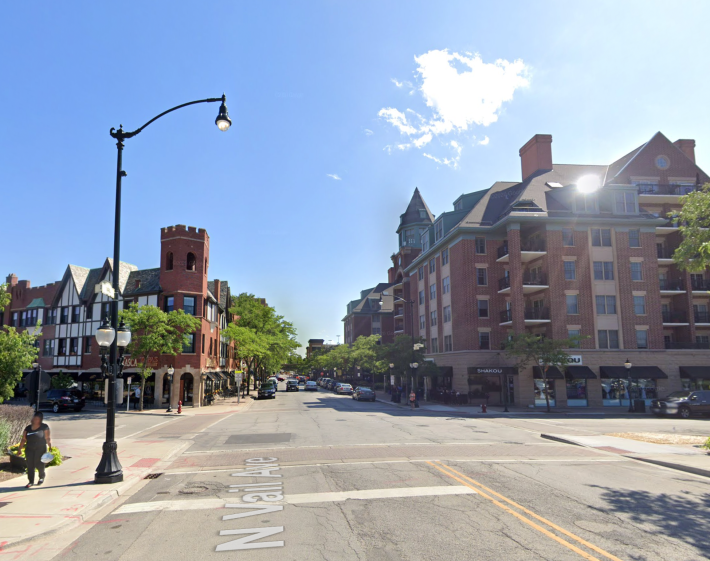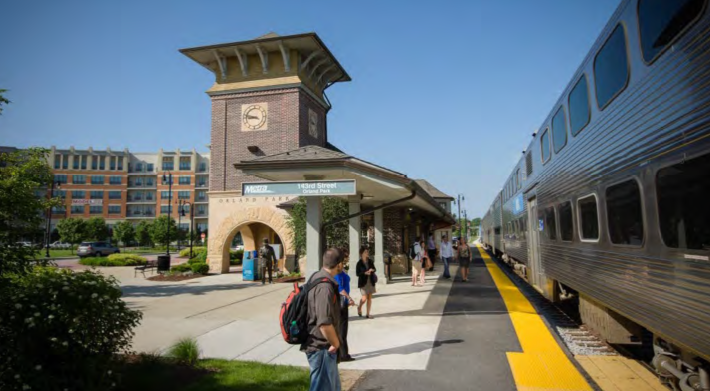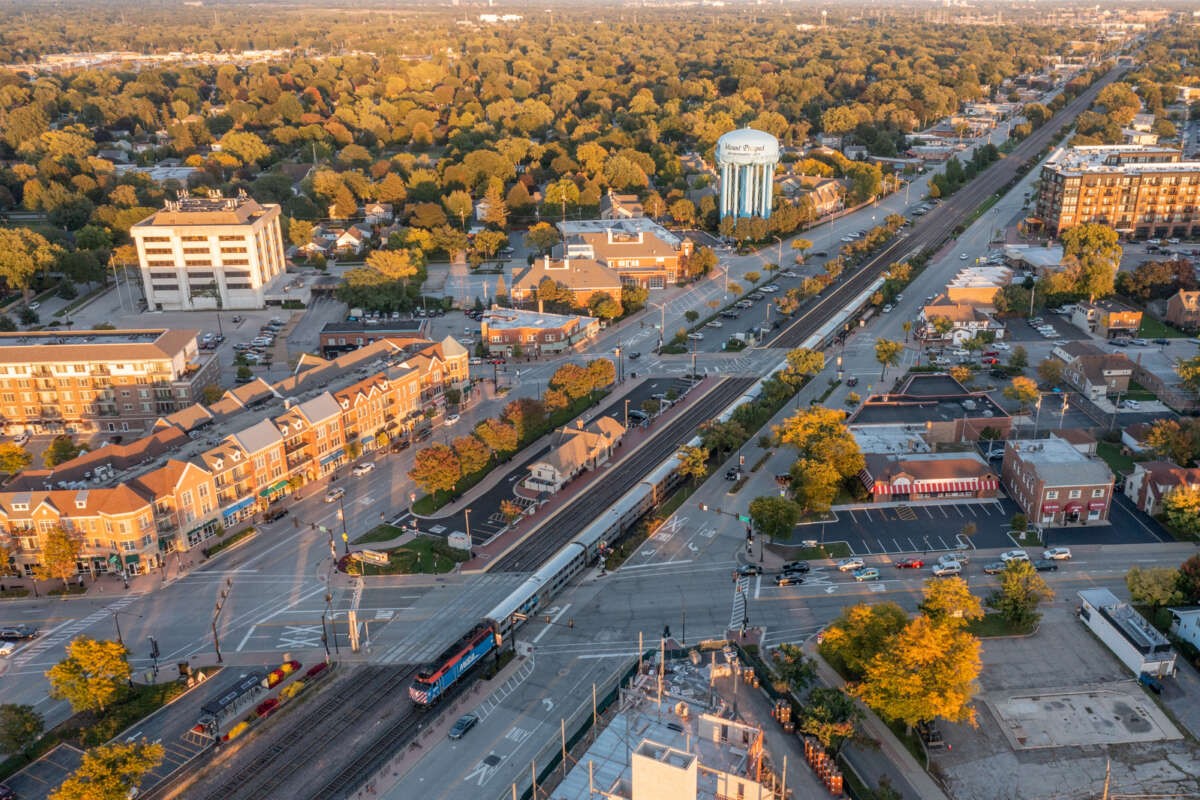
By Ben Wolfenstein
Ben Wolfenstein is Abundant Housing Illinois' State Legislative Lead.
Read the Suburban Mayors Coalition for Fair Transit statement here.
Read the Capitol Fax post about it here.
Recently, the Illinois Municipal League published a statement from 25 suburban mayors and village presidents, calling themselves the Suburban Mayors Coalition for Fair Transit. It lists concerns about state legislative proposals for the Northern Illinois Transit Authority, a more powerful substitute for the current Regional Transportation Authority, and revenue sources to address Chicagoland's impending $771 million transit budget gap.
As Capitol Fax Editor Rich Miller noted, this statement, and the apparently newly formed coalition, "[seem] a bit late." Negotiations about the looming fiscal cliff have been going on for nearly three years.
The SMCFFT statement itself is full of misrepresentations, contradictions, and disingenuous claims. Streetsblog Chicago previously discussed the proposed $1.50 fee for motor vehicle-based retail and restaurant delivery, aka the "Burrito Taxi Tax."
And Star:Line Chicago refuted the coalition’s claims about the proposed NITA board structure. But a major portion of the SMCFFT statement discusses development issues, so let's dissect some of their arguments around that subject.
Real Estate Transfer Tax
SMCFFT: "The proposed $3 per $1,000 real estate transfer tax would apply to transactions in suburban Cook, DuPage, Kane, Lake, McHenry, and Will Counties while excluding the City of Chicago. This new tax would add to the growing barriers to affordable housing in our communities. Furthermore, it would derail parallel legislative efforts that aspire to improve housing access across the state."
Well, yes, this new transfer transfer would "[exclude] the City of Chicago" because Chicago already has such a tax in place that goes directly to the CTA. It's misleading for the coalition not to acknowledge that fact.
As for the affordable housing claim, while it’s true RETT can negatively impact housing affordability by slowing construction and making transactions more expensive, this is a disingenuous claim from these municipalities. Five of the signees represent municipalities that don’t meet the statewide housing affordability requirements set out by the Affordable Housing Planning and Appeal Act: Highland Park, Burr Ridge, North Barrington, Libertyville, and Oak Brook.
The parallel legislation that would "improve housing access across the state" includes AHPAA as well as HB 1813, which would legalize coach houses statewide, and HB 1814, which would legalize two-, three-, and four-flats in most municipalities. SMCFFT statement signees Hoffman Estates, Carol Stream, Elk Grove Village, Batavia, Schaumburg, Wheaton, Burr Ridge, Willowbrook, Addison, and Oak Brook all filed witness slips against one or both of those bills. Oak Brook and Willowbrook both filed witness slips against HB 1814, a law that wouldn’t even apply to them!

If these suburbs are actually concerned about eliminating barriers to affordable housing, why did they oppose the referenced "parallel legislation” and why haven’t they addressed those barriers themselves? It’s because they’re not actually interested in affordability, but rather they’re interested in defending local control. More on local control and housing affordability in a bit.
Development Authority
There’s a lot to unpack in this paragraph from the SMCFFT, so we’ll go sentence by sentence.
SMCFFT: "The proposed authority for the new regional transit entity to acquire, develop, or redevelop property within a half-mile of transit stations or eighth-mile of bus stops raises serious concerns about local control and private property rights."
The transit supportive development clause in the NITA reform bill might be the most important long-term impact of this legislation. NITA would be able to acquire, develop, or redevelop property within a half-mile of transit stations or an eighth-mile of bus stops as well as operate those real estate holdings. NITA will have to comply with local zoning and variances or rezonings will be up to the discretion of the municipality. This is important because right now the CTA, Metra, and Pace are not allowed to develop any of their landholdings into anything besides commuter parking lots.
Other transit operators, most notably the Hong Kong Metro and the Japan Railways Group companies that operate the Shinkansen high-speed rail network, are able to build and operate real estate, which is where they make most of their money. In 2023, the JR Group lost a total of $167 million operating trains, but turned a total profit of about $1 billion thanks to real estate holdings.
Real estate could be the recipe for long-term fiscal sustainability for NITA, making some of the current revenue mechanisms only temporary and reducing the risk of a repeat of this year's fiscal cliff.
Half-mile and eighth-mile are not very large radii, so the scope of NITA’s real estate powers would be limited. In addition, 11 of the municipalities that signed don't even have Metra stations, so the new agency's development authority would barely affect them.
The idea that NITA's new development abilities would interfere with private property rights is patently ridiculous, because there’s no eminent domain issue here. These municipalities are trying to cry government overreach, but for the transit agency to develop land would be functionally no different than any other private developer purchasing land and building on a parcel they own. Speaking of government overreach…
SMCFFT: "Even with the inclusion of local zoning requirements, granting such powers to an unelected regional board would allow development across broad swaths of suburban communities potentially overriding local planning efforts."
You can’t protest government overreach of private property rights, and then defend zoning in the same paragraph. But that’s exactly what these municipalities did. Simply put, zoning tells people what they’re allowed to build on their property, and suburban municipal zoning codes are very restrictive. In this sentence they contradict their previous implication that NITA's building authority would override local control, by acknowledging that the NITA would have to comply with local zoning codes. Then they immediately contradict themselves again by saying NITA developments would override local planning efforts.

Local planning goals are documented in a municipality’s comprehensive plan, which guides future development by shaping zoning ordinances. Again, the area around transit that NITA would be able to build on is limited, hardly the "broad swaths" that the signees mention. In this limited area, a suburb would have almost total control over what NITA could build, just like the municipality has for any other (also unelected) private developer.
SMCFFT: "This also includes concerns about the regional board exerting authority over local parking requirements."
First of all, the regional board would not be exerting authority over parking requirements, the state is. The "People Over Parking Act" in SB2111, the Senate bill that passed on May 31 but wasn't voted on by the House, would prohibit local municipalities from mandating car parking in any developments near train stations.
And, again, the coalition's position here undermines its claim of "concerns about... private property rights," since requiring parking on privately owned land infringes on those rights. Eliminating parking mandates near stations is as key element of the legislation's Transit Supportive Development section. Nothing in the bill would stop NITA or private developers from building car parking if they choose to do so. In fact everywhere parking mandates have been repealed, developers continue to build parking, they just build less of it.
Nixing parking requirements can increase development by 40-70 percent and lower the cost of home construction, a savings that is passed on to residents. Increased home construction would lower housing prices, and address Illinois’ massive housing shortage. Parking reform is the main reason for Minneapolis’s housing boom, and why rents are typically below what a four-person household making 60 percent of the Area Mean Income (about $75K) could comfortably afford, according to Streets MN.
A major complaint among Illinois residents is high property taxes. And some suburbs are reallocating RTA sales tax revenue because they struggle to fund basic services. As such, it's a bad idea to require parking lots, a land use that produces a minimum amount of tax revenue.
Less parking means more walkability, and more people close to transit. On the other hand, if you have a train stop where destinations are at least 1,500 feet away from the station due to required parking moats, it's no surprise when ridership is low. The key to successful public transportation is to locate people and services near transit infrastructure.

SMCFFT: "These decisions should remain under municipal governments."
Should they? I’ll just share Los Angeles housing advocate Toby Muresianu’s tweets reacting to California’s debate on SB 79, which would actually override local control by upzoning areas around transit stations:
SMCFFT: "We are asking you, our legislators, to stand up for our hometowns and your constituents in northeastern Illinois and across the state. We urge you to pass legislation that would provide for a more efficient and regionally balanced approach to public transit. We further hope this new legislation will align new revenue sources with access to transit service, ensures meaningful representation for all subregions, and preserves local authority over land use, parking and development."
The major efficiency in transit reform would be to combine the CTA, Metra, and Pace into a single integrated, regional transit agency, or at least the more clout-heavy NITA oversight bureau to replace the largely toothless RTA. But the word on the street is that the collar counties don’t want consolidation. Any claim to the opposite should be taken with a grain of salt.
Housing advocates are very familiar with the "Not In My Backyard" strategy of opposing development proposals late in the game by asking those in charge to slow down the process and gather more input, while complaining about parking. This approach is also known as "concern trolling": Delay, delay, delay until the proposal falls apart.
SMCFFT: "Transit reform should focus on improving service, expanding access and financial sustainability, not on development powers at the expense of municipal autonomy or creating new burdens on residents with little connection to the transit system."
By opposing transit supportive development, the signees are contradicting both their stated opposition to proposed revenue streams that could be offset by TSD, and their claim they want reform that promotes "financial sustainability".
SMCFFT: "We respectfully ask to be included in ongoing discussions to better collaborate on a path forward that supports fair, reliable, and equitable public transit for all northeastern Illinois.
Thank you for your service and for your attention to this critical issue."
This statement is a last second attempt to gum up the works. Taking these mayors at face value will likely result in an outcome similar to the nightmare now happening in Pennsylvania. Due to a lack of state funding, the board of Philadelphia's SEPTA system just approved a 45 percent service cut and 20 percent fare hikes, which would surely lead to the dreaded transit death spiral.
Chicagoland and downstate transit funding now lies in the hands of suburban state legislators who are listening to their local governments. But the arguments made by these mayors don’t hold up to any scrutiny. Suburbanites who don’t want to see the region's economy wither and traffic get even worse should contact their state lawmakers and tell them to ignore these shortsighted mayors.
In the near future, Streetsblog Chicago will look at some of the land use around transit stations in these municipalities
Read the Suburban Mayors Coalition for Fair Transit statement here.
Read the Capitol Fax post about it here.

Did you appreciate this post? Streetsblog Chicago is currently fundraising to help cover our 2025-26 budget. If you appreciate our reporting and advocacy on local sustainable transportation issues, please consider making a tax-deductible donation here. Thank you.




